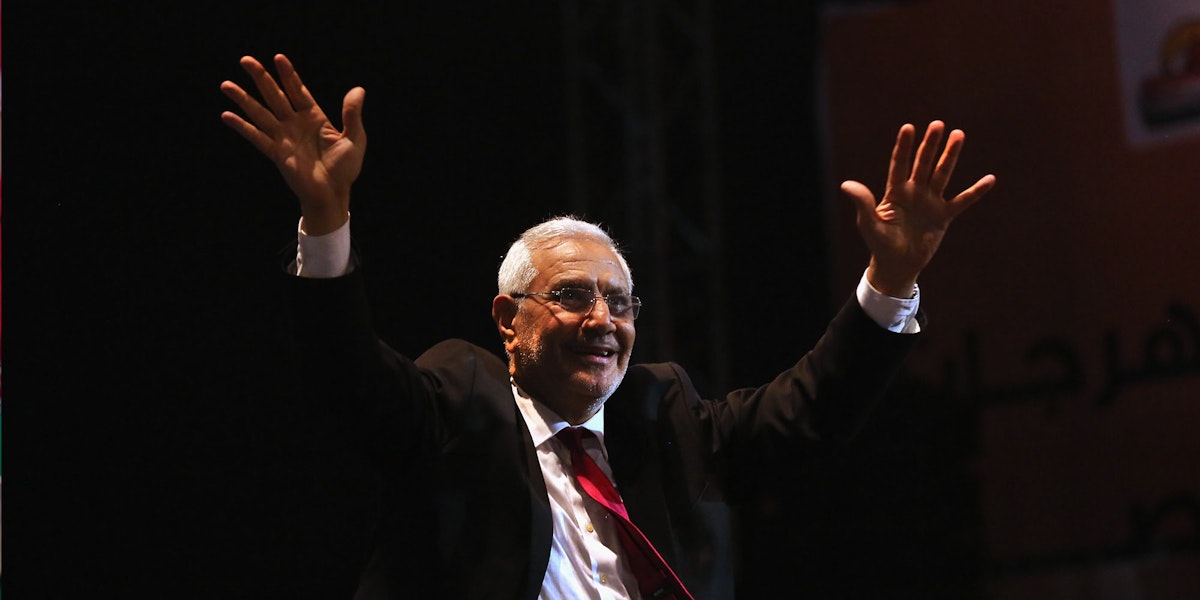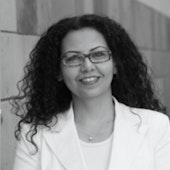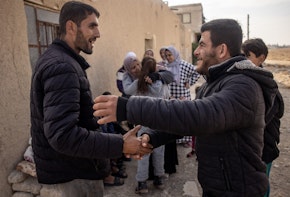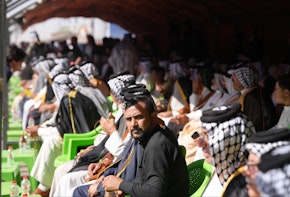Alongside her academic work at the American University of Cairo (AUC), political scientist Rabab El Mahdi has been continuously involved in civil society and political activism in Egypt. In 2012, El Mahdi surprised many of her allies on the secular left when she joined the Egyptian presidential campaign of Abdel Moneim Aboul Fotouh, a former Muslim Brotherhood leader who ran on a platform of personal piety and public secularism. El Mahdi continues to teach and research at AUC, although many of the movements with which she’s been involved—including Aboul Fotouh’s political organization, Strong Egypt—have disbanded or been crushed by state repression. El Mahdi spoke with Thanassis Cambanis at The Century Foundation in October 2018 about the lessons of the rare secular–Islamist alliance in which she took part.
Thanassis Cambanis: Your experience in the Egyptian presidential campaign of 2012 seems like it’s still relevant today, because it’s one of the only examples in contemporary politics where leftists and Communists partnered up with a former Muslim Brotherhood politician. They formed a political party which endorsed, among many other things, a secular government and the separation of religion from state. How did you bridge those two very different political cultures, and who were the people that responded to that political call?
Rabab El Mahdi: In my mind, the most similar example would be the social democratic experience in Europe. In that sense, we’re not talking about merging two independent political ideas, but, rather, developing something different. We were bringing together ideals of social justice, gender parity, and pluralism, and putting them in a grassroots, indigenous language. We were also trying to bridge the gaps between the “authentic” and the “modern” in politics, which is an artificially constructed binary. We did this by focusing on issues and moving away from ideologies. By that, I mean bringing on people who had worked on certain grassroots initiatives, and providing them with the political and theoretical ammunition to help them speak in terms of social justice, and deliver on such terms. These people—many of whom were former Muslim Brotherhood members—wanted to bring about social justice, but there is nothing that the Islamists have to say that will actually bring about social justice.
Cambanis: And these people are generally religious?
El Mahdi: Yes, they are all definitely religious. This was why this experience was eye-opening for me. I knew on a theoretical level that you can keep religion in the private sphere and that Soviet-style secularism is oppressive, but in Egypt after the uprising, I have witnessed how this could happen in practice. This is the epitome of secularism, whereby you actually separate the private sphere from the public sphere when it comes to your religious beliefs. So, the people I worked with are people who are religious and who choose a conservative, religious lifestyle, and they also see the necessity of tolerating other ideals and lifestyles. They do not need to be alienated from their religious beliefs in order to work toward a pluralist and tolerant society.
Cambanis: Was it a challenge to persuade this constituency that separating their personal piety from their view of public politics was the right way forward?
El Mahdi: To tell you the truth, I found it much more challenging to convince the so-called “nationalist secularists” to be tolerant than the so-called “Islamists” who we actually bought into this project. The latter did not have as many deep-rooted preconceived notions about what is right and wrong, except from a very limited, religious view. The moment was also ripe for such persuasion. This constituency was part of a revolutionary moment where preexisting notions were challenged and destroyed. They did not feel intimidated. Politics and pressing real-life issues took precedent over ideology and dogmas. They were looking for new and realistic answers and knew they wouldn’t find them in religious texts. They didn’t have to make a choice between being religious and supporting a pluralist society—and I like to use the word “pluralistic” because it is a more accurate description of what this project was about.
Cambanis: So they had strong values, but not the same rigid notions about politics?
El Mahdi: Exactly.
Building Coalitions
Cambanis: These religious people and groups moved toward accepting the idea that it didn’t matter what the religion of the head of state was or that a secular state would be in charge of things. Of course, just as they went from something religious to secular, others also went quite a distance to temper their leftism to something more liberal. This was an amalgamation that, to me, looked more like a liberal–nationalist coalition made up of religious people and leftists.
El Mahdi: I would prefer not to say “liberal–nationalist,” because those are two factions, especially in Egyptian politics, which I particularly dislike. In essence, it was a social-democratic experience. Think of the German left and the wider European left, where I would be on the more radical, socialist side, but there would also be social democrats and religious people. Or some leftist formations built around liberation theology in Latin America—even though we were not trying to provide a reinterpretation of Islam, as the liberation theologists were for Catholicism. So, it wasn’t a project that was supposed to fit my own politics per se. Instead, I was trying to provide an option that remained true to the ideals of this revolution, which would bring together the core values that the majority believed in—individual rights, social justice, et cetera—but not restrict the interpretation of those values along the lines of a rigid school of thought. Many of my own leftist comrades felt I was being hypocritical. But this was not the Bolshevik revolution. In fact, it was very reformist and you wanted something that provided a common denominator that was broad but progressive enough.
Cambanis: Were there nonreligious, secular, liberal, well-educated people who found appeal in this message?
El Mahdi: Of course. I had phone calls and support from one of the few women in the film industry who were staunchly anti-Islamist and vocally in opposition to the religious establishment. They were huge supporters of the campaign. For them, in the beginning, it was the perfect antidote to their fear of a hardline Islamist government. Also, Abdel Moneim Aboul Fotouh himself came across as someone who was unlike a stereotypical Islamist. In fact, he was the only candidate among the five main candidates who had a female senior adviser. Even the liberals didn’t have this.
Cambanis: The progressives and liberals were completely chauvinistic, not internally democratic. The liberals were not even liberal.
El Mahdi: Exactly. Aboul Fotouh and the people around him might not have known exactly what secularism should be, but their hearts were in the right place and all that they needed was some clarity of ideas.
Cambanis: Is the intellectual work that began in that campaign continuing in some other space? It’s not happening in active political life, so is it happening elsewhere?
El Mahdi: On an individual level, yes. There are a number of people who were associated with this project who continue to ask relevant questions about the nature of the state in Islam, or how about how we deal with civil laws pertaining to marriage, and other such issues. This is the political manifestation. In terms of the academic background work that needs to go into that, that is not the work of the kind of people who were directly involved in this project. That should be the work of research centers. There are questions that need to be asked. In terms of our project, we explicitly stated that it was not a reformist–Islamist project, but something different.
Cambanis: At the dawn of the twentieth century, Europe witnessed civil-war levels of violence between Bolsheviks and right-wing religious movements, fascists, and Communists. By midcentury we had Christian Democrats and Social Democrats being absorbed into the same political order, committed to a shared political process. They’ve salvaged from very extreme religious views something that they call “Christian,” and from very hard-left views something that they call “social,” and each of those groupings contained probably five or ten formerly very Balkanized bodies of thought.
El Mahdi: Absolutely. I hate having to use such analogies, because they are very Eurocentric. But just to make things more relevant, I would have said that the Brotherhood might have been the new Christian Democrats, though more to the right—because they span a wide range of thought within them. Whereas the constituency I worked with was a range of Social Democrats.
Cambanis: Or the new Egyptian liberals of the 1920s, to put it back in the Egyptian context. The Brotherhood was very similar to the Wafd Party of the 1920s in terms of their economic approach and internal decision-making process.
Homegrown Social Democratic Alternatives
El Mahdi: Yes. What we were trying to do with that presidential campaign and with that party was to provide an indigenous, homegrown social democratic alternative. So the religious part was out, and this is why I won’t say the analogy is with the Christian Democrats. We agreed that the religious approach would be an individual reference for people—the party leaders might be good pious Muslims, but they would keep their personal beliefs separate from the political project.
Cambanis: On the other end of the spectrum, where in Egyptian political and public life today do ideas like “robust secularism” live? Ironically, “robust secularism” featured more strongly in your platform than it did in the so-called liberal platform.
El Mahdi: As you know, we do not have political contestation in Egypt today. There are no viable competing options for us to say which is more secular. We’re left with the regime, which is definitely not secular and does not even contend with ideas of secularism, despite claims to the contrary. Those in the regime are comfortable with what they have and their big idea is reforming the religious discourse so that it fits the ideals of Egyptian president Abdel Fattah el-Sisi as a Sufi.1 The current regime does not want to keep religion in the private sphere. Instead, it wants its particular use and understanding of religion to be unchallenged. With the disappearance of competing political parties and civil society, there is no one to challenge that or put forward a different agenda. Many of the rights that are associated with secularism—such as individual rights or freedom of expression—are just gone.
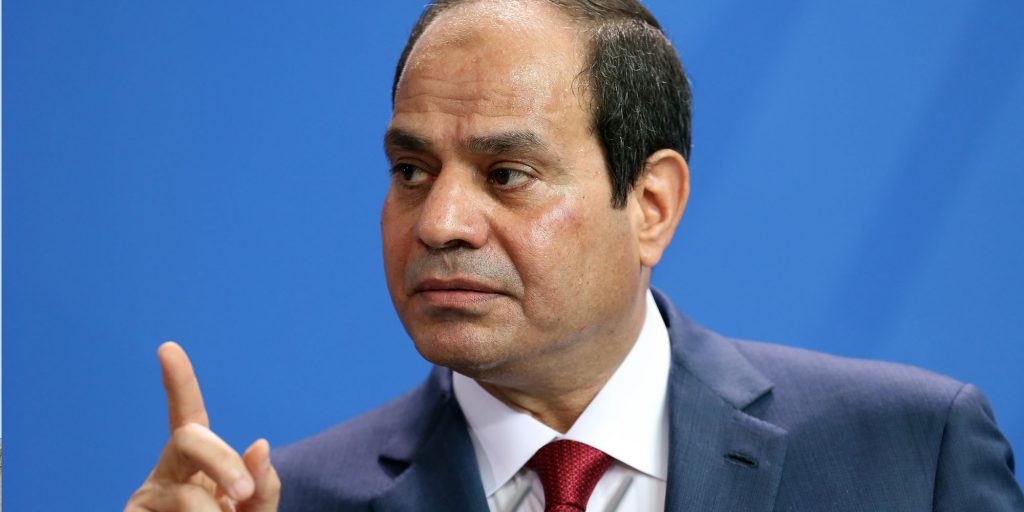
In terms of discourse about rights within society, however, there is a new vibrancy and a new set of discussions that we did not witness ten years ago. But it remains constrained to the private sphere and hidden behind closed doors—nothing of a collective nature.
Cambanis: If there is a consensus among the ruling class about what the Egyptian state is today, how do they describe it? Is it a Muslim state with managed religion? Is it a civil state? What is the establishment’s idea of itself in those terms?
El Mahdi: It’s a Muslim state with a regime monopoly on defining Islam.
Cambanis: Would it call itself a civil state? A “dawlah madaniyyah”?
El Mahdi: Definitely. It calls itself a civil state despite the fact that the head of state is from the military and constantly uses religious references. However, it does this to put itself in opposition to what the Brotherhood was. This is not about constructing or identifying what the state is. It’s actually about othering the Brotherhood.
Cambanis: It’s also interesting to think about this alliance between Sisi, the United Arab Emirates, and Syria, which is quite different from the alliance between Libyan military commander Khalifa Haftar and Saudi Arabia. Some of this is a result of political convenience, of course, but the political leadership in Syria, Egypt, and the Emirates shares a common, somewhat disingenuous discourse of “managing difference.” They often peddle themselves abroad as “guardians of secularism and minorities.” I think it’s very cynical and problematic, but it’s also a unified bloc that is selling this idea—not just abroad, but internally as well.
El Mahdi: And they feed off each other and help each other consolidate this narrative both inside and outside their countries.
Cambanis: Is the idea that communal identities are allowed, so long as they don’t translate into political mobilization and questioning?
El Mahdi: Communal identities are allowed only within the parameters and confines placed by the regime on those communities. So a community of Copts, for example, is something that the Egyptian regime recognizes and welcomes, because it’s actually easier to deal with them as a community and herd them into certain directions than as a political, rights-seeking community of individuals. On the other hand, Shia are not a community because their being a community would challenge the regime’s narrative of Islam.
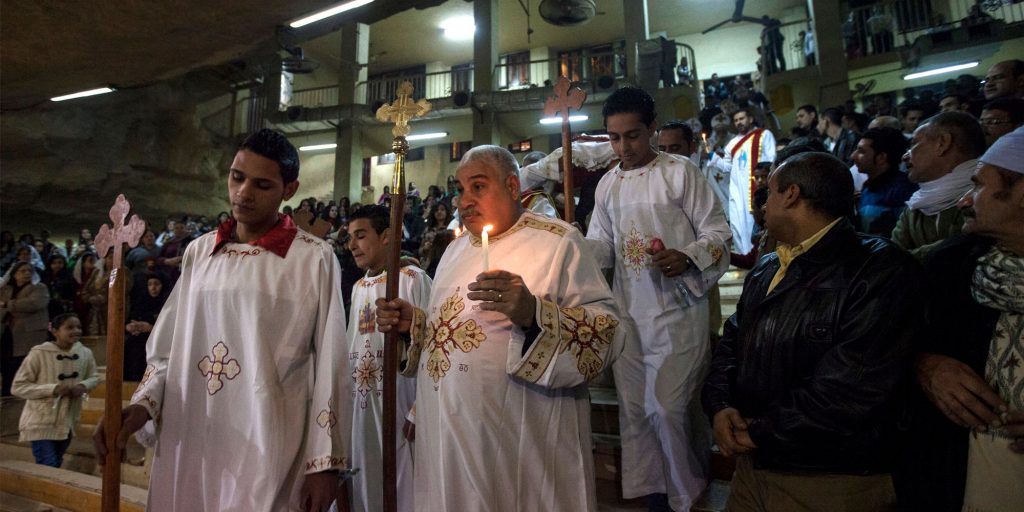
Cambanis: Is this a continuation of the postcolonial history of the region? Is this similar to Anwar Sadat, or is it an innovation?
El Mahdi: It’s continuous with the entire postcolonial, nation-state-building process in the region and the postcolonial social-engineering projects. Those leaders attempted to define who was a community and who was not. And it’s not just about the definition of citizenship, but also the very self-definition of every individual and whom they identify with—and, accordingly, the possibility for alliances and loyalties. Even when it comes to sects, they are constructed in every way.
Cambanis: When we look at the political moment that we’re in, it’s often easy to think that these experiments and innovations have come to a dead stop. But when I look over very turbulent periods of history, both in the Middle East and elsewhere in the world, the same types of thinking continue, even when politics makes certain things impossible in public. The evolution of such thought continues, sometimes in an awful direction, sometimes in a useful direction. So, I imagine in ten or twenty years we’ll see where this arc—publicly manifested in Aboul Fotouh’s candidacy in 2012—has continued and where it will come to fruition.
All around the world, there’s a new, pervasive antiestablishment sentiment. And it’s difficult and scary because the contours of what is to come are not yet clear—things can go in any direction.
El Mahdi: Absolutely. The difficulty of this moment is that, as Gramsci put it, “the old is dying and the new cannot be born.” We are at the crossroads, and the pervasive antiestablishment sentiment has been manifesting itself in different places but also in different ways—from uprisings, to Occupy Wall Street, and election results in Brazil, India, and the United States, along with the unexpected rise of people like Jeremy Corbyn or Bernie Sanders. We are seeing momentum in different directions. But it’s also very difficult and scary because the contours of what is to come are not yet clear, and it can go any way.
Cambanis: And the unique problem in the region, particularly in Egypt, is the lack of a forum in which to contest and develop these ideas. Because there is no open or permitted forum, it has to happen in distorted ways.
El Mahdi: Absolutely. But just like earlier episodes of history, the lack of such a forum has never meant a complete bashing of possibilities. I choose to believe that the energies that came out in 2011 cannot just dissipate into thin air.
This transcript has been edited for clarity.
This interview is part of “Citizenship and Its Discontents: The Struggle for Rights, Pluralism, and Inclusion in the Middle East,” a TCF project supported by the Henry Luce Foundation.
Cover Photo: Egyptian presidential candidate Abdel-Moneim Abul-Fotouh greets supporters at his last major campaign rally in Cairo, Egypt. Source: John Moore/Getty Images
Notes
- The term “Sufi” as used here does not refer to a specific Islamic sect or order, but rather to a specific understanding of Sunni practices and beliefs in general. There are many adherents of Sufi orders in Egypt, and it has been speculated that Sisi is influenced by Sufi perspectives. However, he has never declared himself to be a Sufi. See Amira Mittermaier, “The Politics of Divine Intervention,” Social Science Research Council, June 25, 2014, https://tif.ssrc.org/2014/06/25/the-politics-of-divine-intervention/.
